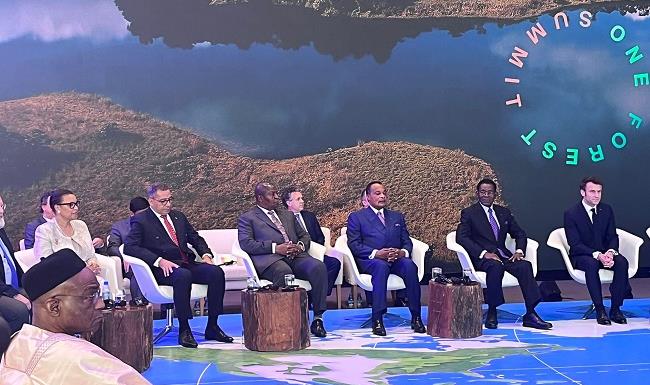Collaborative action is vital to prevent the runaway effects of climate change and loss of biodiversity, the Commonwealth Secretary-General, Patricia Scotland, told a conference of global leaders and experts on Thursday, March 2, 2023.

Speaking at the One Forest Summit in Libreville, Gabon, the Secretary-General said it is clear a regenerative and inclusive approach is needed to tackle the burgeoning issues.
She urged Heads of Government, Ministers of State and world experts to utilise co-operation and partnership to work together on finding the solutions needed to build a stable, peaceful and prosperous future for subsequent generations.
She added: “It is clear [that reversing biodiversity loss] is going to take a regenerative approach and it is also clear that it is going to take all of us.
“If you look at what the experts have been saying – they have all been saying the same things. Number one, that we need to collaborate more, number two, we are not going to be able tackle these crises unless we really understand the data, and number three that solutions are going to demand the inclusion of every sector and a multilateral, multinational approach.
“So, I am glad that most of the countries who have spoken at the Summit are members of the Commonwealth family. We have 56 countries, 2.5 billion people – 60% of whom are under the age of 30 – but the rest are our friends, and we need our friends to solve this crisis.”
The conference, held by the President of Gabon, Ali Bongo Ondimba, and the President of France, Emmanuel Macron, seeks to secure commitments around the protection of vital forest ecosystems like the Congo Basin, and see the inception of initiatives to reverse the global loss of biodiversity.
Gabon became the 55th member of the Commonwealth at the Commonwealth Heads of Government meeting in Rwanda last June, joining alongside Togo.
It is now one of 56 countries representing 2.5 billion people, of which over 60% are under the age of 30.
The Secretary-General used her speech to commend Gabon for its world-leading work on the environment, and from which other Commonwealth countries can learn from.
Gabon is 88% covered by forests, making it at the forefront in the fight against global warming and the protection of biodiversity.
It has pledged to protect its land and ocean areas and is making strides in monetising carbon credits.
She also thanked and praised President Ali Bongo and President Macron for their decisive leadership on the issue and their heartfelt partnerships with the Commonwealth.
Biodiversity is particularly important for the Commonwealth as it is home to to 23% of the world’s land area, 8.8 million km² of forest land, nearly one third of all oceans and critical biodiversity ecosystems like the tropical forests of Papua New Guinea and keystone species like savanna elephants.
The Commonwealth also includes 400 endemic species – those restricted to geographical areas. Nearly a third (29%) of the world’s megadiverse countries are members of the Commonwealth, with many in tropical regions.
The Commonwealth helps member countries protect their environments and use their natural resources sustainably through programmes such as The Blue Charter, The Living Lands Charter, the Commonwealth Sustainable Energy Transition Agenda and the Commonwealth Climate Finance Access Hub, which helps countries unlock climate finance.
As of January 2023, the initiative has unlocked $67.5 million, and an additional $2.9 million in co-financing.
